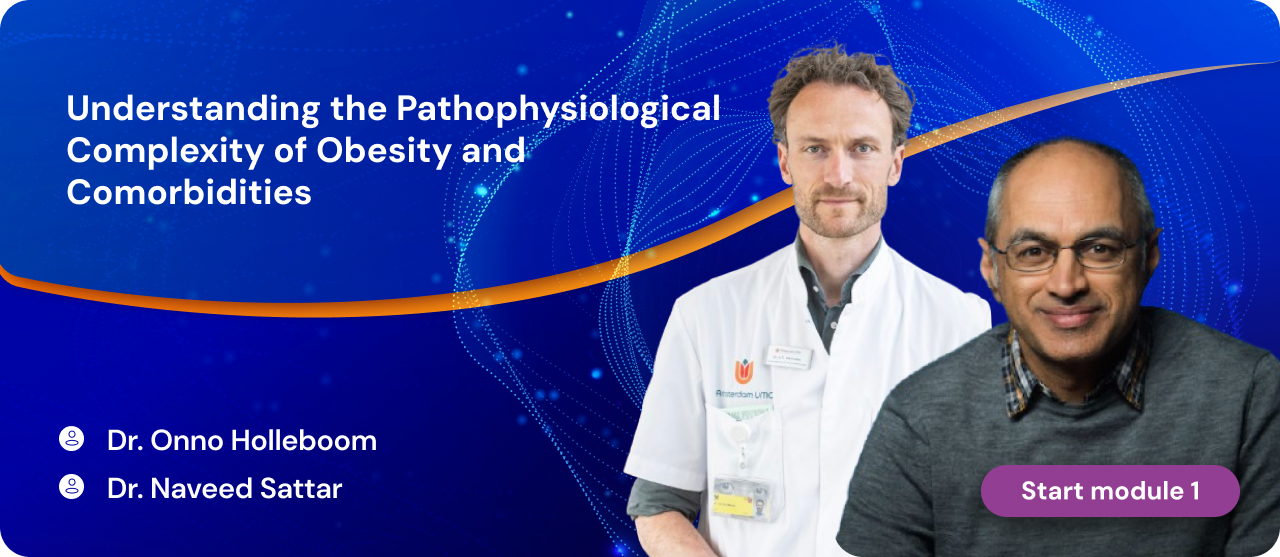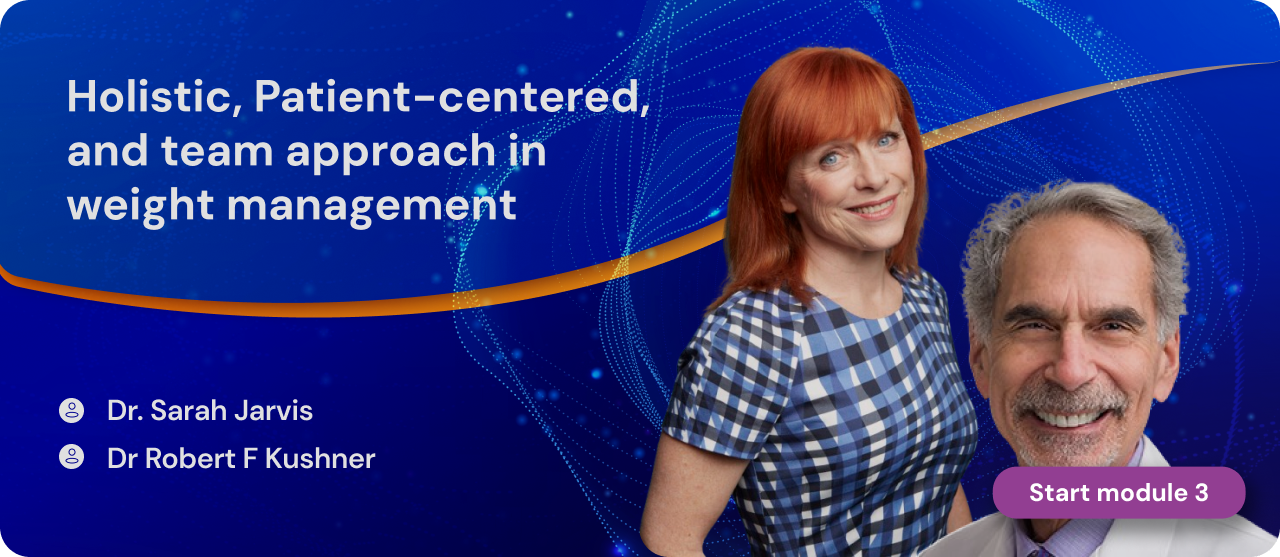Management of People Living with Obesity & Comorbidities
Clinical insights | Real-world expertise | Evidence-based learning

Meet our Global Experts

Dr. Marc-André Cornier

Dr. Onno Holleboom

Dr. Sarah Jarvis

Dr. Amalia Gastaldelli

Dr. Naveed Sattar

Dr. Robert F. Kushner

Dr. Marc-André Cornier

Dr. Onno Holleboom

Dr. Sarah Jarvis

Dr. Amalia Gastaldelli

Dr. Naveed Sattar

Dr. Robert F. Kushner

e-Space Obesity online educational program is developed to educate clinicians managing patients with obesity and to increase the awareness of the multidimensional nature and complexity of the disease, including the interconnectivity between obesity and cardio-renal-metabolic complications, such as Metabolic Dysfunction-Associated Fatty Liver Disease (MAFLD)/Metabolic Dysfunction-Associated Steatohepatitis (MASH), Cardiovascular Disease (CVD) and Chronic Kidney Disease (CKD).
After completing this program, clinicians will be better aware of best practices and recent guidelines on the management of obesity and their patient centric approach.
- Incorporate treatment strategies based on a better understanding of the pathophysiological complexity of obesity and the interplay between overweight/obesity and the cardio-renal-metabolic syndrome, in patients with comorbidities that include MASLD/MASH, CVD and CKD.
- Assess the underlying factors contributing to obesity and the multidimensional impact of obesity on people when developing management plans for these patients.
- Apply a holistic, patient-centered and team-based approach in weight management, incorporating the latest insights into doctor-patient communication and “people-first” language.
Management of people living with obesity and comorbidities
From shared pathophysiology to shared management
e-Space Obesity online educational program is developed to educate clinicians managing patients with obesity and to increase the awareness of the multidimensional nature and complexity of the disease, including the interconnectivity between obesity and cardio-renal-metabolic complications, such as Metabolic Dysfunction-Associated Fatty Liver Disease (MAFLD)/Metabolic Dysfunction-Associated Steatohepatitis (MASH), Cardiovascular Disease (CVD) and Chronic Kidney Disease (CKD).
After completing this program, clinicians will be better aware of best practices and recent guidelines on the management of obesity and their patient centric approach.
- Incorporate treatment strategies based on a better understanding of the pathophysiological complexity of obesity and the interplay between overweight/obesity and the cardio-renal-metabolic syndrome, in patients with comorbidities that include MASLD/MASH, CVD and CKD.
- Assess the underlying factors contributing to obesity and the multidimensional impact of obesity on people when developing management plans for these patients.
- Apply a holistic, patient-centered and team-based approach in weight management, incorporating the latest insights into doctor-patient communication and “people-first” language
Understanding the Pathophysiological Complexity of Obesity and Comorbidities
Learning Objectives
- LO 1 Explain the pathophysiology and the metabolic pathways of obesity.
- LO 2 Illustrate how obesity impacts the cardiorenal metabolic syndrome.
- LO 3 Apply the different treatment strategies for obesity.
Faculty

Dr. Onno Holleboom
Dr. A.G. (Onno) Holleboom MD PhD is an associate professor and internist in Vascular Medicine and Endocrinology at Amsterdam UMC, The Netherlands. He heads a multidisciplinary outpatient clinic for MASLD together with hepatology.

Dr. Naveed Sattar
Assessing underlying factors and multidimensional impact of obesity
This module explores the genetic, environmental, behavioral, and psychosocial factors contributing to obesity. It emphasizes individualized assessment, tools for evaluation, and evidence-based management strategies to address obesity’s multidimensional impacts and improve patient outcomes.
Learning Objectives
- LO 1 Evaluate the physiological, psychological, and environmental contributors to obesity using a comprehensive patient assessment.
- LO 2 Analyze the physical, psychological, social, and economic consequences of obesity on individuals and healthcare systems.
- LO 3 Design and implement personalized, multidisciplinary management plans for obese patients with severe comorbidities.
Faculty

Dr. Amalia Gastaldelli

Dr. Marc-André Cornier
Dr. Cornier is a Professor of Medicine with Tenure, James A. Keating Endowed Chair in Diabetes, and Director of the Division of Endocrinology, Diabetes and Metabolic Diseases at the Medical University of South Carolina.
Holistic, Patient-centered, and team approach in weight management
Learning Objectives
- LO 1 Apply the principles of holistic and patient-centered care by developing individualized care plans that address physical, emotional, social, and cultural factors impacting the patient's well-being.
- LO 2 Demonstrate effective communication skills by using people-first language to respectfully and empathetically engage with patients and colleagues, fostering a positive and inclusive healthcare environment.
- LO 3 Ability to collaborate with interdisciplinary team members to design and implement comprehensive weight management strategies that integrate medical, nutritional, behavioral, and psychosocial interventions
Faculty

Dr. Sarah Jarvis

Dr. Robert F Kushner
Understanding the Pathophysiological Complexity of Obesity and Comorbidities
This module will explore the definition, classification, and pathophysiology of obesity, and will provide a comprehensive overview of its far-reaching health consequences and the need for a systematic, multidisciplinary approach to its management.

Learning Objectives
Incorporate treatment strategies based on a better understanding of the pathophysiological complexity of obesity and the interplay between overweight/obesity and the cardio-renal-metabolic syndrome, in patients with comorbidities that include MASLD/MASH, CVD and CKD.
Faculty

Dr. Onno Holleboom
Dr. A.G. (Onno) Holleboom MD PhD is an associate professor and internist in Vascular Medicine and Endocrinology at Amsterdam UMC, The Netherlands. He heads a multidisciplinary outpatient clinic for MASLD together with hepatology.
Click here

Dr. Naveed Sattar
Dr. Naveed Sattar graduated from the University of Glasgow in 1990. In early 1992 he took up his first post as a senior house officer (SHO) at Edinburgh Royal Infirmary; returning to Glasgow later that year as an SHO at the Victoria Infirmary.
Click here
Assessing underlying factors and multidimensional impact of obesity
This module explores the genetic, environmental, behavioral, and psychosocial factors contributing to obesity. It emphasizes individualized assessment, tools for evaluation, and evidence-based management strategies to address obesity's multidimensional impacts and improve patient outcomes.

Learning Objectives
Assess the underlying factors contributing to obesity and the multidimensional impact of obesity on people when developing management plans for these patients.
Faculty

Dr. Amalia Gastaldelli
Dr. Prof. Amalia Gastaldelli, PhD, is a Research Director at the Institute of Clinical Physiology (IFC) of the National Research Council (CNR) in Pisa, Italy, where she heads the Cardiometabolic Risk Group and the Multi-Omics Mass Spectrometry Laboratory.
Click here

Dr. Marc-André Cornier
Dr. Cornier is a Professor of Medicine with Tenure, James A. Keating Endowed Chair in Diabetes, and Director of the Division of Endocrinology, Diabetes and Metabolic Diseases at the Medical University of South Carolina.
Click here
Holistic, Patient-centered, and team approach in weight management
This module explores holistic and patient-centered care in obesity management. Learn effective communication, reduce stigma with people-first language, and leverage multidisciplinary teams to improve outcomes. Includes real-world examples and case studies for practical insights.

Learning Objectives
Apply a holistic, patient-centered and team-based approach in weight management, incorporating the latest insights into doctor-patient communication and “people-first” language
Faculty

Dr. Sarah Jarvis
Dr. Sarah trained at Cambridge and Oxford universities and became a partner in an inner city general practice in 1990. She was a GP trainer for 25 years until 2017. She is an active medical writer and broadcaster and is the resident doctor…
Click here

Dr. Robert F Kushner
After finishing a residency in Internal Medicine at Northwestern University, Dr. Kushner went on to complete a postgraduate fellowship in Clinical Nutrition and earned a master’s degree in clinical nutrition and nutritional biology…
Click here
